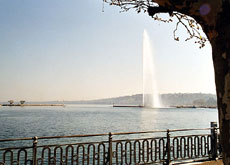Summit stakes are high for the Swiss

As preparations for the World Summit on the Information Society (WSIS) enter their final stages, the pressure is on for Swiss and United Nations officials to make the event a success.
Switzerland – the event’s host country – has been responsible for organising security, as well as rallying worldwide support for the summit objectives.
The broad aim of the three-day meeting is to come up with an action plan to bridge the digital divide and provide equal and affordable access to information for all people of the world.
But disagreements have already emerged in the discussions leading up to the event over issues such as financing and freedom of expression.
Feeling the heat
“The stakes for Switzerland in all of this are quite high,” political analyst, Julian Hottinger, told swissinfo.
“This is an area where Switzerland feels it has something to contribute… and it would like this summit to be a success and to solve some of the key issues that are supposed to be dealt with in Geneva,” he added.
As home to the European headquarters of the United Nations – which handles a variety of humanitarian issues – Geneva is no stranger to diplomatic exchange.
But this is the first time Switzerland has hosted a UN world summit and the pressure is on to ensure that policy makers take an active interest in producing a workable final declaration.
“A failure of the summit would produce only losers on all sides,” said Wolfgang Kleinwächter, a civil society representative at the summit.
“There must be a certain level of flexibility to the diplomatic negotiations and everyone must be prepared to give and take, while sticking to their basic values,” he added.
Political interest
For several months, the Federal Office of Communications has been lobbying hard to convince world leaders – who’ve had their hands full with pressing international and domestic matters – to attend the summit.
Some 62 heads of state and government from 135 countries are expected to turn up for the event.
But Hottinger predicts that international conflicts, like the ongoing violence in Iraq and the Middle East, are likely to distract attention from the discussions.
“The dates of this conference were set a long time ago and it’s a long-term project that just happens to show up at the wrong moment,” he said. “Political tension elsewhere is attracting more attention and there’s a general feeling that maybe this isn’t important now.”
But Canadian summit expert, Maurice Strong, who’s been advising the Swiss government throughout the preparation process, argues that the timing for such an event couldn’t be better.
“The information age, or knowledge age, is going to be and is already emerging as the central defining element in our civilisation,” Strong told swissinfo.
“This conference is not only important, it’s timely… and it has the possibility to start us down the road to a knowledge society in which the benefits of technology are available to all and not just a privileged few.”
Security
Besides working to convince world leaders to turn up, the Swiss have also been busy in recent months making security arrangements for when they get here.
Just six months ago, Geneva and Lausanne were rocked by violent protests during the G-8 summit in the neighbouring French town of Evian, forcing the authorities to draft in reinforcements from Germany.
But the cabinet’s special delegate to the summit, Daniel Stauffacher, says the police expect to have the situation well in hand this time around.
“We have been making our preparations for over a year and a half on a cantonal and federal level,” Stauffacher told swissinfo.
“All along, the police have been reviewing possible security risks and at this point, we don’t have any indication of threats or large demonstrations being planned,” he added.
Stauffacher credits the event’s multi-stakeholder approach for moving traditional summit opponents off the streets and to the negotiating table.
“From the beginning, we have tried to include all the stakeholders in this process, including business leaders, civil society and non-governmental organisations,” Stauffacher said.
“So it might help that they’ve been invited to take part, rather than standing on the sidelines protesting,” he added.
swissinfo, Anna Nelson in Geneva
As the host country of the World Summit on the Information Society, Switzerland has been lobbying hard to rally global political support for the summit objectives.
Funding and freedom of expression are two of the key issues expected to come up for debate during the summit.
But it’s feared that world events, such as the ongoing violence in Iraq, could distract international attention from the discussions.
Swiss officials say they are confident that the discussions will not be marred by violent protests, because traditional summit opponents have been invited to the negotiations.

In compliance with the JTI standards
More: SWI swissinfo.ch certified by the Journalism Trust Initiative
You can find an overview of ongoing debates with our journalists here. Please join us!
If you want to start a conversation about a topic raised in this article or want to report factual errors, email us at english@swissinfo.ch.